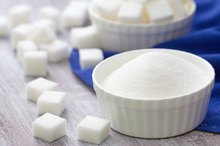Bad Effects of Chemicals in Our Food
Food contains nutrients essential for health, but it may also include chemicals that can increase your risk of disease. These chemicals can include pesticides, herbicides, fertilizers, preservatives, artificial colors and flavors, and industrially produced fats and sweeteners. Not all of these substances may appear on the food product label.
Pesticides
Fruits and vegetables that contain pesticide residues can be a health risk for people of all ages. Research by scientists at the Harvard University School of Public Health published in “Pediatrics" in June 20101 discovered exposure to organophosphates may contribute to the prevalence of attention deficit hyperactivity disorder in children. Children who switch to organic produce no longer have significant levels of organophosphates in their urine, according to research by scientists at Emory University published in "Environmental Health Perspectives" in April 2008. Exposure to a combination of the pesticide maneb and the herbicide paraquat increases risks of Parkinson’s disease, especially in young people, according to research by scientists at the University of California in Berkeley published in the "American Journal of Epidemiology" in April 2009.
- Fruits and vegetables that contain pesticide residues can be a health risk for people of all ages.
- Children who switch to organic produce no longer have significant levels of organophosphates in their urine, according to research by scientists at Emory University published in "Environmental Health Perspectives" in April 2008.
Preservatives
What Are the Dangers of Preservatives?
Learn More
Manufacturers use preservatives such as nitrites and sulfites in processed foods to inhibit growth of microorganisms and increase shelf life. Yet these preservatives increase your health risk. Nitrites are common preservatives used in processed meats and fish to prevent bacterial growth. Your body converts nitrites to carcinogenic substances called nitrosamines. Research by Susanna Larsson at the Karolinska Institute in Stockholm published in the "International Journal of Cancer" in August 2006 found that increased nitrosamine consumption from processed meat increases the risk of stomach cancer. Sulfites used to preserve dried fruits, fruit juices, wine and beer may increase the risk of asthma attacks, according to the Cleveland Clinic.
- Manufacturers use preservatives such as nitrites and sulfites in processed foods to inhibit growth of microorganisms and increase shelf life.
Artificial Colors
Artificial colors increase consumer appeal but may also increase your risk of disease. The Center for Science in the Public Interest, a consumer advocacy group, reports that caramel coloring used in many popular cola soft drinks contains two chemicals called 2-methylimidazole and 4-methylimadazole that cause cancers of the lungs, liver and thyroid and leukemia. Food colorings such as Yellow No. 5, 6 and10 and Red No. 40 can increase the risk of or exacerbate hyperactive behavior in children.
- Artificial colors increase consumer appeal but may also increase your risk of disease.
- The Center for Science in the Public Interest, a consumer advocacy group, reports that caramel coloring used in many popular cola soft drinks contains two chemicals called 2-methylimidazole and 4-methylimadazole that cause cancers of the lungs, liver and thyroid and leukemia.
Fats and Sweeteners
The Disadvantages of High Saturated Fat Levels
Learn More
Industrially produced fats and sweeteners common in processed foods are bad for your health. Manufacturers use transfats -- which increase your risk of coronary artery disease -- in breads, cookies, margarine and microwave popcorn. High-fructose corn syrup, a sweetener used in soft drinks, salad dressings and desserts, can increase your risk of obesity, according to research by scientists at Louisiana State University in Baton Rouge published in "The American Journal of Clinical Nutrition" in April 2004. Piedmont Hospital in Atlanta reports eating high-fructose corn syrup can increase your risk of diabetes.
- Industrially produced fats and sweeteners common in processed foods are bad for your health.
- Piedmont Hospital in Atlanta reports eating high-fructose corn syrup can increase your risk of diabetes.
Related Articles
References
- "Environmental Health Perspectives"; Dietary Intake and Its Contribution to Longitudinal Organophosphorus Pesticide Exposure in Urban/Suburban Children; Chensheng Lu, et al.; Apr 2008
- "American Journal of Epidemiology"; Parkinson's Disease and Residential Exposure to Maneb and Paraquat from Agricultural Applications in the Central Valley of California; Sadie Costello, et al.; Apr 15 2009
- "International Journal of Cancer"; Processed Meat Consumption, Dietary Nitrosamines and Stomach Cancer Risk in a Cohort of Swedish Women; Susanna Larsson, et al.; Aug 15 2006
Resources
Writer Bio
Jeffrey Traister is a writer and filmmaker. For more than 25 years, he has covered nutrition and medicine for health-care companies and publishers, also producing digital video for websites, DVDs and commercials. Trained in digital filmmaking at The New School, Traister also holds a Master of Science in human nutrition and medicine from the Columbia University College of Physicians and Surgeons.








